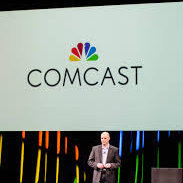Comcast, Programmers Sue Maine Over Cable à la Carte Law
They claim the new state law focused on cable operators is preempted by federal law, violates First Amendment.

Comcast and several programmers have joined forces to sue the state of Maine and a number of state townships over a new law mandating cable operators enact à la carte policies that allow consumers to subscribe to TV channels on an individual basis.
The suit, filed Friday, September 6, argues the Maine law, also known as L.D. 832, is preempted by federal law and also violates the First Amendment. The complaint seeks a court order that preliminarily and permanently blocks the state from enforcing new law.
Joining Comcast as defendants in the case are A&E Television Networks, C-SPAN, CBS, Discovery, Disney Enterprises, Fox Cable Network Services, NBCUniversal, New England Sports Network (NESN) and Viacom.
Sponsored by US Rep. Jeff Evangelos (I-Friendship), L.D. 832 "requires that cable system operators offer subscribers the option of purchasing access to cable channels individually." The law reasons consumers should be able to pay only for the channels they want rather than having to pay for programming in operator-managed bundles.
The lawsuit was filed more than a month after the Maine Legislature passed L.D. 832 on June 3, and a few weeks after it was enacted on June 15, 2019. Maine Governor Janet Mills allowed L.D. 832 to become law without her signature, The Bangor Daily News reported, noting that the new mandate is set to take effect September 19.
Cable operators, other pay-TV providers and programmers have long argued and presented data from the Government Accountability Office and other sources showing that an à la carte regime would break a pay-TV business model built on bundling economics, and that ultimately consumers would end up paying more if the model shifted to à la carte.
To amplify that point, programmers have claimed à la carte would result in a loss of advertising revenue typically obtained from tiered carriage; they would be forced to recover this by charging higher license fees to cable operators that would pass increases along to subscribers. Programmers also have argued many niche channels could be driven out of business if they are dropped from cable lineups.
Cable-focused law
Comcast and the programmers also criticized the Maine law for limiting the mandate to cable operators and exempting satellite and telco TV providers as well as the wave of virtual MVPDs, such as Sling TV, AT&T TV Now, YouTube TV, Hulu and PlayStation Vue from the burdens of the state's à la carte mandate.
"Maine's effort to foist an 'à la carte' regime on these industry participants not only is unlawful, but would end up causing the very harms it seeks to avoid -- namely, higher costs and reduced programming choice," the defendants stated, according to the 53-page complaint obtained by Light Reading.
They claim that L.D. 832 is "expressly preempted" by provisions of the Communications Act, including those that prohibit municipalities from functioning as franchising authorities and establishing requirements for video programming, save for "very limited respects not applicable here."
Maine's law also would fly in the face of federal must-carry requirements that certain broadcast TV stations be part of a cable operator's basic tier, they said. "There is no way for a cable operator to adhere to these federal requirements while also complying with L.D. 832," the complaint states.
Comcast and the programmers also argue the Maine law violates the First Amendment, and that the issue does not solely center on unilateral decision-making by MSOs or "an exercise of purely contractual rights." Taking away the flexibility to bundle, they claim, "imposes both content- and speaker-based restrictions, infringing the rights of programmers and cable operators."
Though a true à la carte option is not available from US cable operators, there has been a fraying of the traditional bundle as pay-TV providers move to offer slimmed-down "skinny" bundles of programming as well as tiers that don't include ESPN and other expensive sports channels.
Consumers crave à la carte
Despite the business, economic and regulatory barriers Comcast and the programmers present in this case, it's abundantly clear many consumers are interested in à la carte -- and are annoyed at having to subscribe to packages with channels they don't watch and don't want.
According to TiVo's just-released "Video Trends Report" for Q2 2019, 69.9% of those surveyed would be interested in selecting only the channels they want to watch. That's down slightly from the 70.9% who expressed interest in TiVo's study from the year-ago period.
For a self-selected TV lineup, the study found US consumers would want to buy a lineup of about 21 channels and pay $33.30 per month for them. Canadian consumers surveyed wanted fewer channels (18.4) and were willing to pay a bit less ($23.65) than their US counterparts.
TiVo's study, based on a survey of 5,340 adults in the US and Canada, also found ABC is the most wanted major network (57.9%), followed by CBS (51.4%) and A&E and Discovery Channel (both at 48.3%). Among niche/premium channels, the study found consumers would pay $2.07 per month for the SEC Network, $2.12 for Ovation TV and $2.39 for The NFL Network.
Related posts:
— Jeff Baumgartner, Senior Editor, Light Reading
About the Author(s)
You May Also Like












